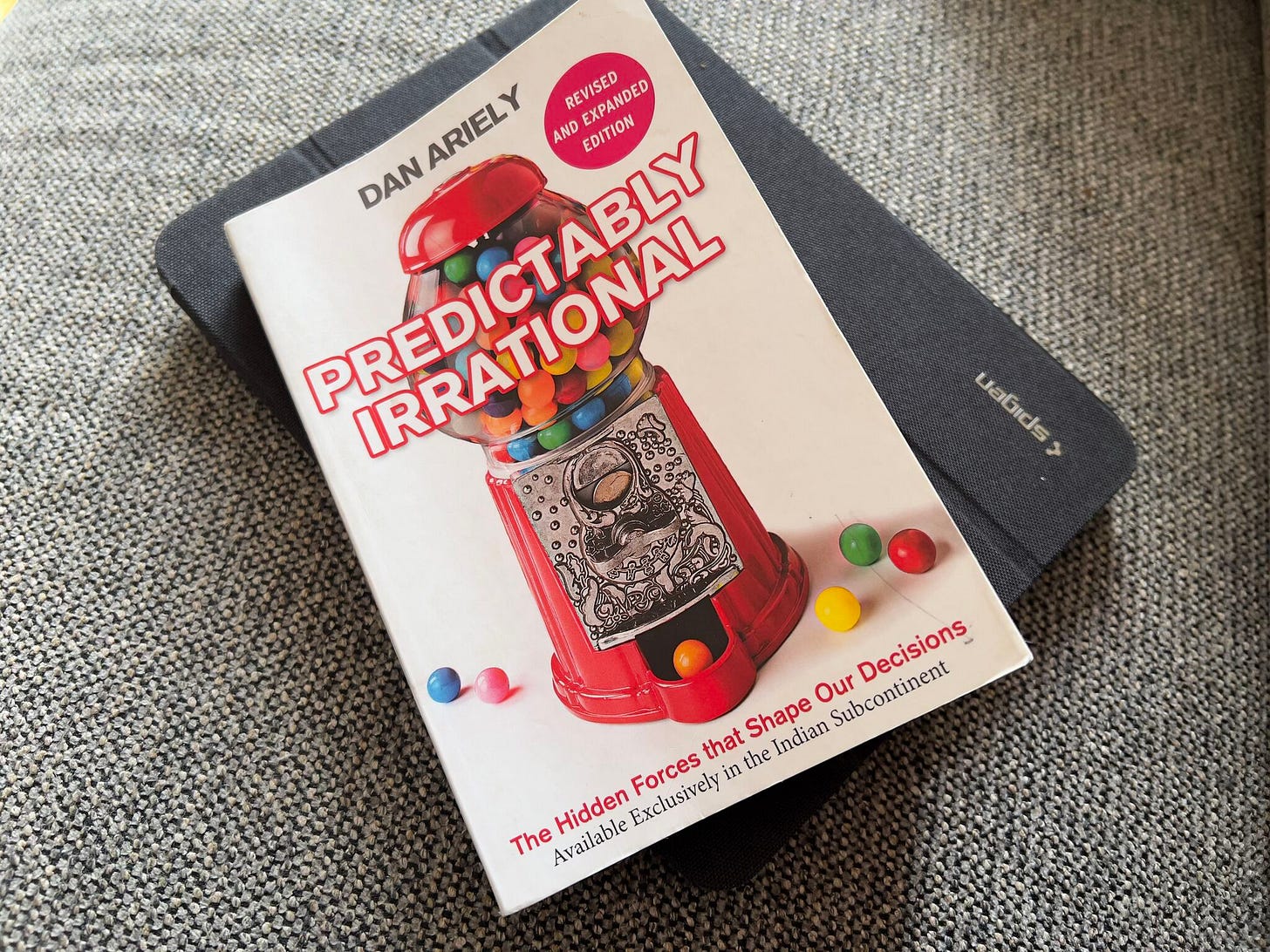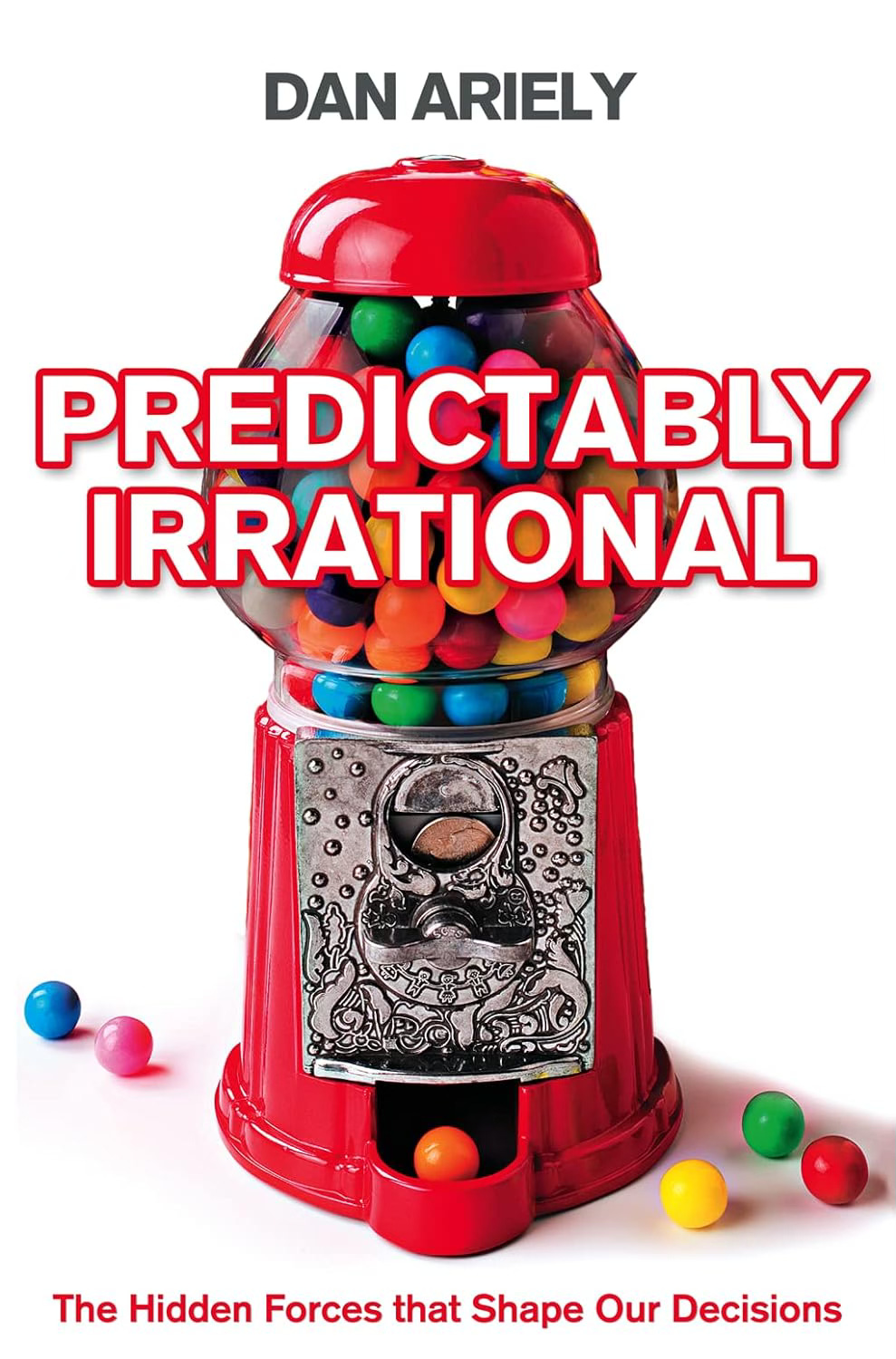Predictably Irrational by Dan Ariely
Discover the hidden forces shaping consumer decisions in our review of Predictably Irrational by Dan Ariely. Explore 10 powerful marketing insights for product marketers, from pricing to emotions.
Ever wondered why people seemingly make illogical choices? What if I told you there's a science to our irrational behaviours, and understanding it can revolutionize your marketing strategies?
Diving into the book of the month, Dan Ariely's "Predictably Irrational" and discover how to harness "The hidden forces that shape our decisions".
What's the Book About? "Predictably Irrational" explores the hidden forces that shape our decisions. Ariely shows us how we often make irrational choices in predictable ways, influenced by expectations, emotions, social norms, and other unseen factors.
Book of May, from my one book a month goal. The book is full of reality, that could potentially transform our approach to product marketing and boost customer engagement and conversions.
Here are highlights I've adapted for product marketers,
Use Relativity in Positioning
We assess options relative to others, Dan says, "We don't have an internal value meter... we focus on the relative advantage of one thing over another". Guide customers introduction comparison points.
Anchor Prices to Influence Perception
The first price seen anchors decisions. "The first price we see becomes the anchor for our decisions" says Dan. Set the right initial price to create lasting value perception
Boost Engagement with Free Offers
"Zero is not just another price. Zero is an emotional hot button - a source of irrational excitement" Free offers can dramatically increase engagement and conversions
Leverage Social Norms for Stronger Relationships
"When social and market norms collide, trouble sets in." People prefer free activities over small payments. Create campaigns that tap into social norms.
Craft Emotionally Resonant Messages
"When we are in a state of arousal, we tend to make decisions that are different from those we would make in a cold state." Understand and leverage your audience's emotional state.
Encourage Immediate Action
"We need to make decisions today that will help prevent temptation tomorrow." Use limited-time offers to combat procrastination.
Increase Ownership Feelings with Trials
"The more work you put into something, the more ownership you begin to feel for it." Offer trials or guarantees to increase purchase likelihood.
Simplify Choices to Accelerate Decisions
"We are willing to pay a high price in the short term to keep doors open." Simplify choices to speed up decision-making and improve satisfaction.
Set Positive Expectations
"Expectations change our reality." Manage expectations through accurate and positive marketing to enhance satisfaction and loyalty.
Elevate Perceived Value with Strategic Pricing
"We associate cost with quality, and the costliness of an item makes us believe it’s better." Use pricing to segment the market and boost perceived value.
Buy this book from Amazon - click here
Top 10 Takeaways for Marketing Leaders:
The Power of Free: People love freebies! The allure of "free" can drive consumer behavior more powerfully than discounted prices, which can be leveraged in promotional strategies to boost engagement and conversion rates.
Anchoring Effect: The first price presented acts as an anchor for all subsequent decisions. For product marketers, setting an anchor price can significantly influence how customers perceive subsequent value propositions.
The Decoy Effect: Adding a less attractive option (the decoy) can sway choices between two others. It’s a fascinating strategy to guide consumers toward a preferred product version.
The Pain of Paying: The more visible or painful the payment process, the less likely people are to go through with a purchase. Streamlining payment methods can increase sales, making it a critical factor in user experience.
The Power of Expectation: Expectations can shape the perceived effectiveness of a product. Managing and setting customer expectations through marketing can enhance satisfaction and brand loyalty.
Over-valuation of What We Have: People tend to place higher value on what they already own. Use this insight in marketing strategies that allow customers to try before they buy, thus increasing the likelihood of purchase after trial.
The Effect of Social Norms: We’re heavily influenced by the behavior of others. Showcasing popular products and user testimonials can leverage peer influence to increase product appeal.
The Influence of Arousal: Decision making can change dramatically under emotional states. Timing marketing messages for when consumers are most receptive can greatly impact their effectiveness.
The Problem of Procrastination and Self-Control: Offering immediate rewards for taking actions can help combat consumer procrastination and boost quick decision-making in campaigns.
The Reality of Supply and Demand: Our desires can be manipulated easily, not necessarily by supply or demand itself but by the context in which choices are presented. Shaping how a product is seen in relation to its competitors can dictate its attractiveness.
Why It's a Must-Read for Marketers: As product marketers, understanding the irrationalities of consumer behavior isn’t just useful; it’s essential. Ariely’s insights provide a deeper understanding of why people buy, which can help us craft more effective and empathetic marketing strategies.
So, whether you're crafting your next campaign, setting prices, or designing a new product, keeping these principles in mind can help you connect more deeply with your consumers and create more compelling marketing narratives.
Happy reading, and here's to marketing that not only meets but anticipates customer needs!
Have you seen these play out in your daily life?
What's interesting to leverage in your strategy?
If you’ve enjoyed the book review, support by sharing with your connections
Disclaimer: As an Amazon Associate, I earn commissions from qualifying purchases. Your purchase helps support my work in bringing you my latest research and writing.




